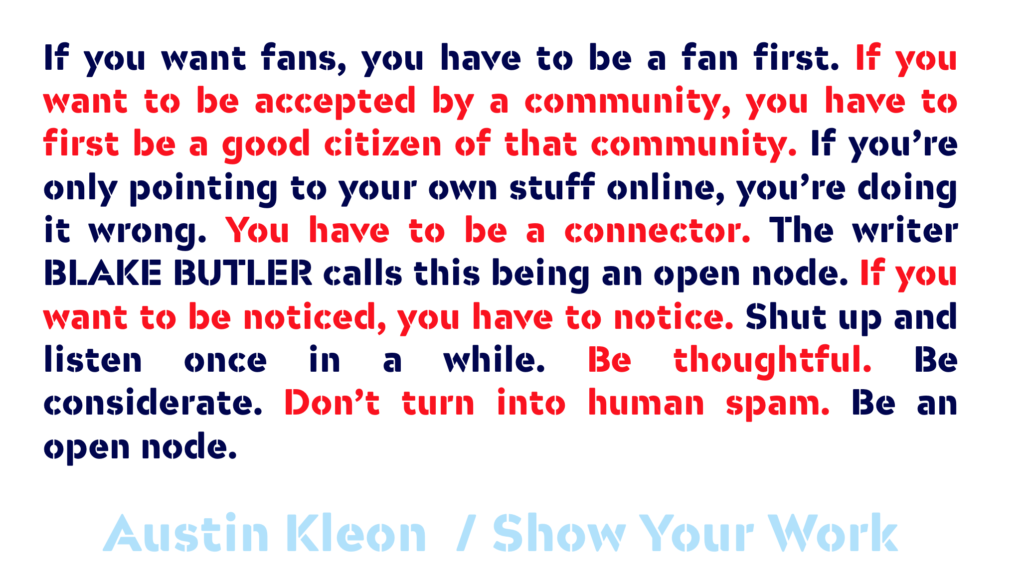Companies that continue to hide their staff from the outside world – that spin the message and blur the lines of engagement with the public – face a far greater risk than simply being left behind in today’s hyper-social and connected environment.
As we move deeper and deeper into the digital bowels of the social web – as we become a society that champions engagement, authenticity, and connection over spin and overly-polished, self-centred one-way messaging – it’s becoming increasingly clear there are organisations that are embracing and adapting to ‘the new reality’, and those that sadly are not.
The companies that are adapting – those that are contributing value to the lives of their customers and stakeholders through content and other initiatives (over and above their products and services), that are cultivating their ‘village of support’ using social networking platforms, and collaborating with other like-minded individuals and brands to increase their reach and relevance – I call these organisations ‘connected brands’.
Disconnected brands
Thus it stands to reason those organisations that are not doing any of these things are, in effect, slowly becoming ‘disconnected’ from the marketplace in which they operate. For the sake of this article, let’s call them ‘disconnected brands’.
One of the dangers of being a disconnected brand is irrelevance.
People are information overloaded and are lumbered with ever-decreasing attention spans. In short, if you’re not connecting emotionally with your audience, there’s every chance you don’t — or won’t at some time soon — figure in their lives. Ouch!
But there is another danger lurking for organisations unwilling to engage openly and authentically; that are not welcoming and transparent and connected with the marketplace and community in which they operate, and it’s this: These companies will not (over time) attract the talent that champions these attributes.
And therein lies the issue.
Today’s savvy connected professional is (or will certainly become) increasingly more valuable to an organisation than someone who is disconnected from, and potentially disinterested in, what’s going on around them in the company’s broader community i.e. their industry, profession, marketplace.
Think of these connected professionals as being ‘open nodes’ (hat-tip Blake Butler via Austin Kleon).

Kleon writes in his excellent book ‘Show Your Work’ that if you want to get, you have to give; if you want to be noticed, you have to notice. Shut up and listen once in a while. Be thoughtful. Be considerate. (You have to become a connector – “be an open node” he says).
The savvy company of the future will be packed to the gills with thoughtful and considerate ‘open nodes’ versus ‘dead weights’ taking up space.
I mean, who would you rather employ?
A motivated and empowered individual who:
- continually grows in character and intellect?
- adds value to and maintains connection with their professional networks?
- constantly reads and generously shares relevant news and information with others?
- uses social media to connect with and learn from others, particularly industry luminaries and thought leaders?
- enthusiastically shares news and stories about the organisation they work for with their own online community?
- creates content around their passions whether or not that has anything to do with work (and thus sharpens their storytelling capabilities)?
… or some ‘social sloth’ who does none of those things, who doesn’t want to feed their brain or nurture their network?
No brainer, right?
Smart, progressive businesses and organisations attract such professionals (the empowered individuals, not the sloths!) making them even stronger and more connected within the community in which they operate. Disconnected companies, however, are not as attractive a proposition for this savvy, sought-after employee.
Now, you might argue this is a generational thing and I’m referring just to Millennials, but that would be missing the point. Granted, Millennials are digitally savvy and socially connected like no other generation.
But some of the smartest business professionals I know sit outside of that age bracket; not only are they talented and highly experienced, they are also super connected thanks to their judicious use of new media technologies. These professionals leverage social media platforms to connect with like minds, share stories and ideas, build purposeful relationships, and grow their online eco-system.
But yes, if we’re focusing on stocking fresh talent for the future, then ‘connected’ Millennials should be the ones your company is aiming to recruit, and they ain’t gonna have a bar of your business if you block Facebook and YouTube, or if they’re not encouraged or empowered to connect with the outside world in a professional sense.
In his book ‘The Purpose Economy’, Aaron Hurst writes that whereas Baby Boomers and Gen X ‘divorced’ their professional lives from their personal and civic arenas, Millennials have blurred the line between professional development and personal self-expression (for example, using social media to deliberately leverage their individuality) and eagerly seek out to reconcile their personal values and desire to serve others in a professional setting.
In other words, companies that don’t encourage self-expression in the workplace, or allow employees to use social networks to add value to and serve others won’t be appealing to the empowered connected professional (‘open node’) who – in numbers – will help ensure an organisation stays vital, social and relevant long into the future.
Connected and empowered individuals (leading to your brand becoming more open, authentic, relevant and trusted) or social sloths (who will ensure your brand remains closed, inauthentic, irrelevant and distrusted).
And of course, it starts at the top.
The choice is yours 👊


